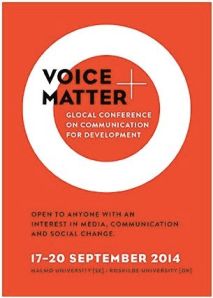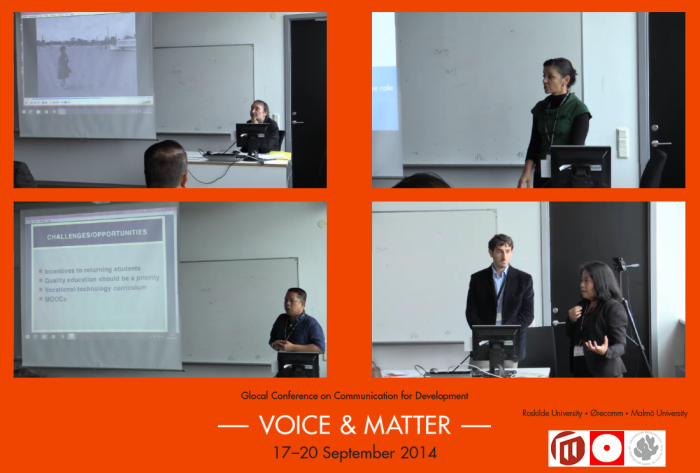The organization of a panel for the Orecomm Festival 2014 provided us with a great chance to elaborate a concept theme including the theoretical as well as methodological concerns we both retrieved in our research projects. After a brainstorming session, we identified in the diaspora, especially in its definitions over time and in its agency, a question to be analyzed in more detail. The study of diaspora, we agreed, poses relevant challenges because much of mainstream discourses and part of academic researches display a disposition towards national bias or representations of the world within national cages and logic of majority/minority. Hence, there is the need to pay attention to both theoretical formulation of the problem, as well as to the elaboration of a pertinent methodology in order to give voice back to actors of the transnational world who tend to be dis-empowered by the strict national-box logic.
Our initial considerations got encapsulated in the following concept note, or “work stream” to use Orecomm’s more appropriate terminology:
Nation-states and national mentalities have shaped societies we live in through reductive classifications. New methods now move beyond this logic, allowing for improved understanding of the changing role of the state over time, and for new transcultural encounters. This panel explores methods in approaching the diaspora context in space and time.
After our brief introduction, the panel started with the presentation given by Kevin Robins, previously Professor of Media and Communications at Goldsmiths College, London and Professor of Sociology at City University, London, now completing a book on transnational Turkish populations living in Europe: he offered one instance of a methodology conceived to move beyond conventional social scientific works, by focusing on “research as encounter”; on the interlocutor’s voice, the dialogue between the researcher and the people or the group s/he is working with, rather than within the “national condition of mental internment and confinement”. In order to illustrate his idea of the encounter as a meaningful meta-physical place to do research, he showed the audience a clip taken from the film Chronique d’un été, which in Robins’ words “is a film of radical and questioning empiricism”.
After this first attractive presentation, we left the floor to Edlira Gjoni, PhD candidate in Communication for Social Change at Tirana University, Albania. She illustrated how “diasporas shape political outcomes daily”, underlining that “with the new ways of reaching fast and wide people and stories, New Media and ICT are helping researchers to move beyond the traditional logic on the role of the state”. Her case study, the participation of the Albanian diaspora in the homeland’s politics, made it clear that media are prompting the end of the politics-is-local paradigm and are giving voice to actors whose agency challenges the closed shell of nation-states.
From Europe to Asia, from politics to education, the panel continued with Evans Rosauro I Yonson, communication Professor of Xavier University in the Philippines. He explained that the international migration of human capital, especially university students, “has become a major concern of national governments in Asia”. His paper focused on three groups of ASEAN intellectuals – Malaysians, Thais, and Filipinos contacted through online survey and in-depth interviews, with the aim of answering some crucial questions, namely: what possible factors bring about the migration of university students from the developing world in the era of globalization? What leads to emigration and return migration? Is return migration a growing phenomenon?
After such interesting reflections on the different histories of diaspora and the alternative methods to avoid what has been called methodological nationalism, the ground was more than set for us to present the last contribution of the panel, with the title “Immigrant Women’s Political Participation in Malmö – Obstacles and Opportunities”. Our joint-project reverted around our collaboration with the Nordic African Women Resource Centre- NAW (you can read more about NAW here), and presented the initial result of a long-term project aiming at increase migrant’s access to the political space. The methodology we adopted was that of Participatory Research, and we shared much with the idea of the encounter as described earlier by Kevin Robins.
Our contribution concluded the panel presentation, and we consequently opened it for questions which came from the audience, both present in the room and following the event online.
Special thanks go to Oscar Hemer, who kindly moderated the panel.
The Histories of Diaspora panelists:
Kevin Robins presented Transcultural Research as Encounter
Edlira Gjoni talked about Voice Matters… If Heard from Afar
Evans Rosauro I. Yonson on Migration of Human Capital: Geographical Mobility of University Students and the Case of Asia
and We discussed Immigrant Women’s Political Participation in Malmö- Obstacles and Opportunities
Watch the recorded session of the Histories of Diaspora here.


Pingback: Project Collaboration with NAW-LRC | Transencounters